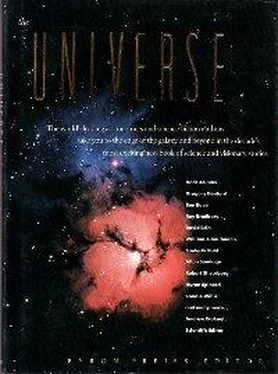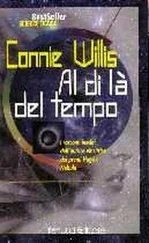Connie Willis - Schwarzschild Radius
Здесь есть возможность читать онлайн «Connie Willis - Schwarzschild Radius» весь текст электронной книги совершенно бесплатно (целиком полную версию без сокращений). В некоторых случаях можно слушать аудио, скачать через торрент в формате fb2 и присутствует краткое содержание. Год выпуска: 1987, ISBN: 1987, Издательство: Bantam Books, Жанр: Фантастика и фэнтези, на английском языке. Описание произведения, (предисловие) а так же отзывы посетителей доступны на портале библиотеки ЛибКат.
- Название:Schwarzschild Radius
- Автор:
- Издательство:Bantam Books
- Жанр:
- Год:1987
- ISBN:0-553-05227-6
- Рейтинг книги:5 / 5. Голосов: 1
-
Избранное:Добавить в избранное
- Отзывы:
-
Ваша оценка:
- 100
- 1
- 2
- 3
- 4
- 5
Schwarzschild Radius: краткое содержание, описание и аннотация
Предлагаем к чтению аннотацию, описание, краткое содержание или предисловие (зависит от того, что написал сам автор книги «Schwarzschild Radius»). Если вы не нашли необходимую информацию о книге — напишите в комментариях, мы постараемся отыскать её.
Schwarzschild Radius — читать онлайн бесплатно полную книгу (весь текст) целиком
Ниже представлен текст книги, разбитый по страницам. Система сохранения места последней прочитанной страницы, позволяет с удобством читать онлайн бесплатно книгу «Schwarzschild Radius», без необходимости каждый раз заново искать на чём Вы остановились. Поставьте закладку, и сможете в любой момент перейти на страницу, на которой закончили чтение.
Интервал:
Закладка:
“Come in and shut the door,” I say, still carefully protecting the liquid barretter, but Müller has already jammed the metal back against the beam.
“Do you have news?” Müller says to the doctor, eager for new facts to spin his theories from. “Has the wiring fatigue come back? Is there going to be a bombardment tonight?”
Dr. Funkenheld takes off his mittens. “I have come to examine your eyes,” he says to me. His voice frightens me. All through the war he has kept his quiet bedside voice, speaking to the wounded in the dressing station and at the stretcher bearer’s posts as if they were in his surgery in Stuttgart, but now he sounds agitated, and I am afraid it means a bombardment is coming and he will need me at the front.
When I went to the dressing station for medicine for my eyes, I foolishly told him I had studied medicine with Dr. Zuschauer in Jena. Now I am afraid he will ask me to assist him, which will mean going up to the front. “Do your eyes still hurt?” he says.
I hand the barretter to Müller and go over to stand by the lantern that hangs from a nail in the beam.
“I think he should be invalided home, Herr Doktor,” Müller says. He knows it is impossible, of course. He was at the wireless the day the message came through that no one was to be invalided out for frostbite or “other non-contagious diseases.”
“Can you find me a better light?” the doctor says to him.
Müller’s curiosity is so strong that he cannot bear to leave any place where something interesting is happening. If he went up to the front, I do not think he would be able to pull himself away, and now I expect him to make some excuse to stay, but I have forgotten that he is even more curious about the wiring fatigue. “I will go see what has happened to Eisner’s unit,” he says, and opens the door. Snow flies in, as if it had been beating against the door to get in, and the doctor and I have to push against the door to get it shut again.
“My eyes have been hurting,” I say, while we are still pushing the metal into place, so that he cannot ask me to assist him. “They feel like sand has gotten into them.”
“I have a patient with a disease I do not recognize,” he says. I am relieved, though disease can kill us as easily as a trench mortar. Soldiers die of pneumonia and dysentery and blood poisoning every day in the dressing station, but we do not fear it the way we fear the front.
“The patient has fever, excoriated lesions, and suppurating bullae,” Dr. Funkenheld says.
“Could it be boils?” I say, though of course he would recognize something so simple as boils, but he is not listening to me, and I realize that it is not a diagnosis from me that he has come for.
“The man is a scientist, a Jew named Schwarzschild, attached to the artillery,” he says, and because the artillery are even farther back from the front lines than we are, I volunteer to go and look at the patient, but he does not want that either.
“I must talk to the medical headquarters in Bialystok,” he says.
“Our wireless is broken,” I say, because I do not want to have to tell him why it is impossible for me to send a message for him. We are allowed to send only military messages, and they must be sent in code, tapped out on the telegraph key. It would take hours to send his message, even if it were possible. I hold up the dangling wire. “At any rate, you must clear it with the commandant,” but he is already writing out the name and address on a piece of paper, as if this were a telegraph office.
“You can send the message when you get the wireless fixed. I have written out the symptoms.”
I put the back on the wireless. Müller comes in, kicking the door open, and snow flies everywhere, picking up Dr. Funkenheld’s message and sending it circling around the dugout. I catch it before it spirals into the flame of the Primus stove.
“The wiring fatigue was pinned down all night,” Müller says, setting down a hand lamp. He must have gotten it from the dressing station. “Five of them froze to death, the other eight have frostbite. The commandant thinks there may be a bombardment tonight.” He does not mention Eisner, and he does not say what has happened to the rest of the thirty men in Eisner’s unit, though I know. The front has gotten them. I wait, holding the message in my stiff fingers, hoping Dr. Funkenheld will say, “I must go attend to their frostbite.”
“Let me examine your eyes,” the doctor says, and shows Müller how to hold the hand lamp. Both of them peer into my eyes. “I have an ointment for you to usetwice daily,” he says, getting a flat jar out of his bag. “It will burn a little.”
“I will rub it on my hands then. It will warm them,” I say, thinking of Eisner frozen at the front, still holding the roll of barbed wire, perhaps.
He pulls my bottom eyelid down and rubs the ointment on with his little finger. It does not sting, but when I have blinked it into my eye, everything has a reddish tinge. “Will you have the wireless fixed by tomorrow?” he says.
“I don’t know. Perhaps.”
Müller has not put down the hand lamp. I can see by its light that he has forgotten all about the wiring fatigue and the Russian magnet and is wondering what the doctor wants with the wireless.
The doctor puts on his mittens and picks up his bag. I realize too late I should have told him I would send the message in exchange for them. “I will come check your eyes tomorrow,” he says, and opens the door to the snow. The sound of the front is very close.
As soon as he is gone, I tell Müller about Schwarzschild and the message the doctor wants to send. He will not let me rest until I have told him, and we do not have time for his curiosity. We must fix the wireless.
“If you were on the wireless, you must have sent messages for Schwarzschild,” Travers said eagerly. “Did you ever send a message to Einstein? They’ve got the letter Einstein sent to him after he wrote him his theory, but if Schwarzschild sent him some kind of message, too, that would be great. It would make my paper.”
“You said that no message can escape a black hole?” I said. “But they could escape a collapsing star. Is that not so?”
“Okay,” Travers said impatiently, and made his fingers into a semicircle again. “Suppose you have a fixed observer over here.” He pulled his curved hand back and held the forefinger of his other hand up to represent the fixed observer. “And you have somebody in the star. Say when the star starts to collapse, the person in it shines a light at the fixed observer. If the star hasn’t reached the Schwarzschild radius, the fixed observer will be able to see the light, but it will take longer to reach him because the gravity of the black hole is pulling on the light, so it will seem as if time on the star has slowed down, and the wavelengths will have been lengthened, so the light will be redder. Of course that’s just a thought problem. There couldn’t really be anybody in a collapsing star to send the messages.”
“We sent messages,” I said. “I wrote my mother asking her to knit me a pair of gloves.”
There is still something wrong with the wireless. We have received only one message in two weeks. It said, “Russian opposition collapsing,” and there was so much static we could not make out the rest of it. We have taken the wireless apart twice. The first time we found a loose wire, but the second time we could not find anything. If Hans were here, he would be able to find the trouble immediately.
“I have a theory about the wireless,” Müller says. He has had ten theories in as many days: The magnet of the Russians is pulling our signals in to it; the northern lights, which have been shifting uneasily on the horizon, make a curtain the wireless signals cannot get through; the Russian opposition is not collapsing at all. They are drawing us deeper and deeper into a trap.
Читать дальшеИнтервал:
Закладка:
Похожие книги на «Schwarzschild Radius»
Представляем Вашему вниманию похожие книги на «Schwarzschild Radius» списком для выбора. Мы отобрали схожую по названию и смыслу литературу в надежде предоставить читателям больше вариантов отыскать новые, интересные, ещё непрочитанные произведения.
Обсуждение, отзывы о книге «Schwarzschild Radius» и просто собственные мнения читателей. Оставьте ваши комментарии, напишите, что Вы думаете о произведении, его смысле или главных героях. Укажите что конкретно понравилось, а что нет, и почему Вы так считаете.












